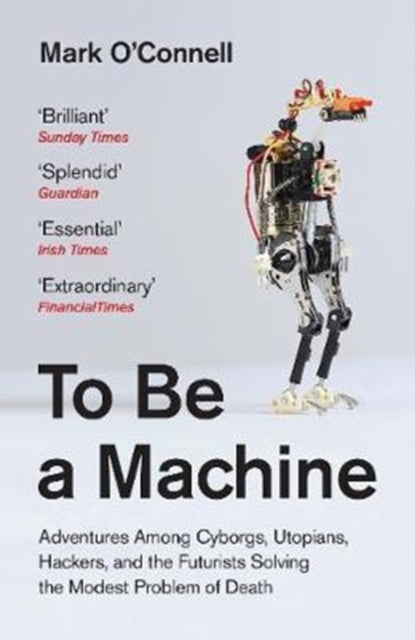
To Be a Machine: Adventures Among Cyborgs, Utopians, Hackers, and the Futurists Solving the Modest Problem of Death by Mark O'Connell
WINNER OF THE WELLCOME BOOK PRIZE 2018
Transhumanism is a California-based movement whose core belief is that “humanity should use technology to evolve beyond its current mental and physical limitations”, said Clive Cookson in the FT. The practices it advocates include cryogenics (freezing bodies in the hope that they may one day be revived), biohacking (augmenting ourselves with implants and prosthetics), and whole brain emulation (copying our personalities onto computers). And in this, his first book, Mark O’Connell – an Irish journalist writing in the “gonzo” style of Hunter S. Thompson – describes his encounters with several of transhumanism’s leading lights. Many of them are “hilarious”. There’s Roen Horn, a virgin saving himself for a riotous future life with “sexbots”; and there’s Zoltan Istvan, one of last year’s presidential candidates, who travels around America in a coffin-shaped “Immortality Bus”. Yet though he can be mocking, O’Connell also shows “sympathy” for the movement’s aims, which he views as having something in common with religion. The result is a work of “extraordinary exuberance and wit”.
Transhumanism may sound like a fringe movement, but “some very rich and influential people” are dabbling in it, said Paul Laity in The Guardian. PayPal cofounder Peter Thiel has pumped millions into the “cause of extending human life spans, especially his own”. Ray Kurzweil, Google’s head of engineering, is the leading prophet of the “Singularity”, the moment when rapid advances in AI will bring about a merging of humans and machines. (He believes this could happen in a “dozen years or so.”) O’Connell explores such beliefs within the wider context of West Coast “radical optimism”, which sees every problem – “even getting old and dying” – as being fixable by technology. And it is his “lack of stridency” – together with his “often splendid writing” – that makes him such a “companionable guide” to this mindset.
If To Be a Machine has a flaw, it’s that O’Connell lacks the scientific literacy to engage with the “technologies on which the transhumanists have pinned their hopes”, said Oliver Moody in The Times. This reduces them to “little more than a menagerie of weirdos”. They may be “wacky”, said David Sexton in the London Evening Standard, but they’re still utterly fascinating. O’Connell “never just plays it for laughs”. Underpinning this “gem of a book” is his “altogether serious” conviction that life, if it has any meaning, is inseparably bound up with what the trans-humanists wish to escape: “birth, and reproduction, and death”.
